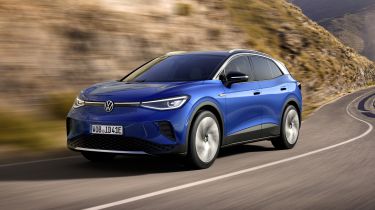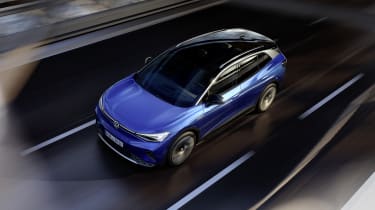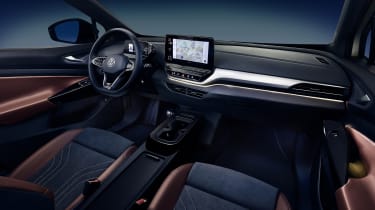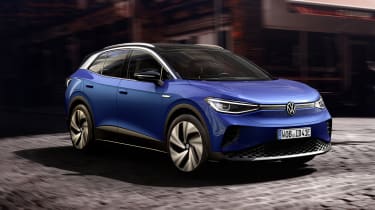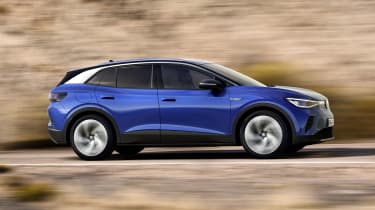Volkswagen ID.4 gets new entry-level models
New City and Pure trims join range along with less powerful ‘Pure’ and ‘Pure Performance’ powertrains
- Three powertrain options now available
- Now available in six trim levels
- Prices start from £32,150
The Volkswagen ID4 is available in two new entry-level trims called City and Style. Both are available with two new powertrains called Pure and Pure Performance that use a 52kWh battery.
The entry-level City model becomes the cheapest in the ID4 range, with prices starting from £32,150. This is the only version of the ID.4 to qualify for the government’s plug-in car grant. The Style variant comes with more standard equipment and starts from £38,150.
The ID.4 is likely to be a big seller for Volkswagen, as it taps into demand for electric cars and SUVs. It shares its underpinnings with the ID.3 and the forthcoming Skoda Enyaq iV, and will be a direct rival to electric SUV models like the Tesla Model Y and Nissan Ariya.
2021 Volkswagen ID.4: interior and trim levels
The City and Style models join the existing 1st Edition, Life, Family and Max, giving buyers a total of six trim levels to choose from. The existing models are significantly more expensive than the City and Style variants, with the 1st Edition available from £40,800, the Life £41,570, the Family £45,520 and the Max £49,990.
Although the cheapest in the range, the entry-level City model still gets a decent range of in-car tech as standard. Features include 10-colour interior ambient lighting and a 10-inch infotainment screen. The City also comes with driver assistance systems such as lane assist and adaptive cruise control. The Style model has Matrix LED headlights, 18-inch alloy wheels, tinted windows, three-zone climate control and a rear-view camera.
Features are sorted into fixed equipment packs across the range to simplify the ordering process for customers, as has already happened with the ID.3.
The Interior Style Package includes a 30-colour ambient lighting for the dashboard and door trims, split-folding rear seats with a load-through hatch and centre armrest, and ‘play and pause’ pedals. The Infotainment Package adds a 10-inch Discover Pro touchscreen system with sat nav and inductive smartphone charging. An LED strip along the bottom of the dashboard can change colour and blink to alert the driver to notifications, and work with the sat nav and safety systems to suggest direction changes. Finally, the Comfort Package brings a heated windscreen, two front and rear USB ports, two-zone climate control, and heated front seats and steering wheel.
The mid-range Family builds on the Life specification by adding 19-inch alloy wheels and upgraded equipment packs. The Design Package Plus brings LED matrix headlights, privacy glass for the rear windows and a large panoramic sunroof. Meanwhile, the Comfort Package Plus upgrades the climate control to a three-zone system with luggage nets in the boot, and the Assistance Package adds a rear-view camera and keyless start.
The range-topping Max is the most comprehensively equipped model. The Infotainment Package Plus gives the ID.4 a larger 12-inch infotainment system and head-up display. The Interior Style Plus pack is bolstered by the addition of sport seats with integrated headrests, front heated seats and massage function with pneumatic lumbar support. Finally, the Assistance Package Plus provides a range of driver assistance tools, including Travel Assist, Lane Assist, Emergency Assist and Side Assist systems, while parking is made easier with the addition of the Area View cameras.
The exclusive ‘1st’ badging marks out the 1st Edition model from the others, alongside brown interior highlights and 20-inch alloy wheels. Standard equipment includes the upgraded LED headlights, a reversing camera, front and rear parking sensors, heated seats and steering wheel, a 10-inch infotainment touchscreen, sat nav and adaptive cruise control.
Piano Black and silver trim adds to its design, while the seats are upholstered in an eco-friendly mix of artificial leather and ArtVelours made from 20% recycled plastic bottles.
Volkswagen also offers a range of optional extras, including a tow-bar and a choice of alloy wheel designs, ranging from 18 to 21 inches in size. Buyers can also opt for a silver roof at a cost of £620 and swap the ID.4’s standard steering wheel for a white version free of charge.
Design
The ID.4 is available in a range of colours including Mangan Grey Metallic, Honey Yellow Metallic, Moonstone Grey, Scale Silver Metallic and Blue Dusk metallic, as well as Glacier White. Buyers can opt for a contrasting black roof at no extra cost, or purchase a silver style pack, which adds silver to the roof trim, roof rails and rear pillars for £620. It’s also possible to choose white interior styling and a white steering wheel at no additional cost.
The ID.4 is the first electric Volkswagen to be fitted with a folding tow bar too, with a towing capacity of up to 1,000 kg.
Practicality
The ID.4 is a little longer than the Volkswagen Tiguan but there’ll be as much space as a larger SUV because there’s no engine. This is in keeping with the Golf-sized ID.3, which has a similar amount of space to the bigger Volkswagen Passat.
It’s also been confirmed that the ID.4 boasts 543 litres of boot space behind the rear seats; not far behind the 615 litres offered by the Tiguan when its sliding rear seats are pushed forwards. Flipping the rear seats down frees up 1,575 litres of space. Fitted with the optional towing bracket, the ID.4 can tow up to 1,000kg.
Range and performance
The City and Style Performance models are available with Volkswagen’s Pure and Pure Performance powertrains. The 1st Edition, Life, Family and Max trims are all only available with the Pro Performance powertrain.
The two Pure power options feature a 52kWh capacity battery, as opposed to the 77kWh battery used in the Pro Performance powertrain in the existing Life, Family and Max variants. The Pure is matched to a 146bhp electric motor, while the Pure Performance version produces a punchier 168bhp.
The entry-level City model paired with the more powerful 168bhp powertrain comes with a price tag of £36,030. This rises to £39,530 for the Style model. In City guise, the ID.4 SUV offers 213 miles of range, while the Style can achieve up to 211 miles on a full charge. All versions come with 100kW rapid charging capability.
At present, the more expensive Life, Family and Max variants are only available with the Pro Performance powertrain. A 77kWh battery is linked to a single, rear-mounted electric motor, which produces 201bhp and 310Nm of torque, giving the ID.4 a 0-62mph time of 8.2 seconds and a top speed of 99mph.
In Life guise, the ID.4 is capable of 323 miles on a full charge, dropping to 318 and 314 miles for the Family and Max variants respectively. Volkswagn says the ID.4 can regain up to 199 miles of range from a 125kW rapid charger in just 30 minutes. A 7.2kW home charger, meanwhile, takes around 11 hours to give the car a full charge.
Like the Volkswagen Golf-sized ID.3, the ID.4 is based on VW’s modular MEB platform, which was developed specifically for electric cars. The platform can accommodate a variety of different electric powertrains, allowing the carmaker to offer less expensive variants that have a single rear-mounted electric motor, two-wheel drive and a smaller battery, as well as range-topping models that have bigger batteries and a second motor on the front axle to give four-wheel-drive.
A performance version is also thought to be in development. Dubbed the ID.4 GTX, it would use the 302bhp twin-motor powertrain from the forthcoming Skoda Enyaq vRS, giving it a 0-62mph time of just over six seconds.
The ID.4 was originally previewed by the ID.Crozz concept, and a Crozz badge features on the Chinese website’s photos. The Crozz concept had more of a coupe SUV shape like the Mercedes GLC Coupe and Audi Q3 Sportback. It’s possible that a sleeker version of the ID.4 may join the range in the future.
The ID.4 is a carbon-neutral car, just like the ID.3. The brand plans to be entirely carbon-neutral by 2050, as it looks to reduce its overall emissions by a third in the next five years. Worldwide, the company plans to introduce 75 new electric cars by the end of the decade.
Read our picks for the best electric SUVs and the best electric cars you can buy this year.
Recommended

New Subaru Trailseeker revealed as rugged electric SUV with 375bhp

New Subaru Solterra brings more range, power and polish
Most Popular

Omoda E5 targets rivals: now with zero deposit and APR

Ford Puma Gen-E driven: Electric charmer or too little, too late?
Tips & advice

Car dashboard warning lights: what does each symbol mean?

Electric car charging stations: public networks, charger types, apps and maps

